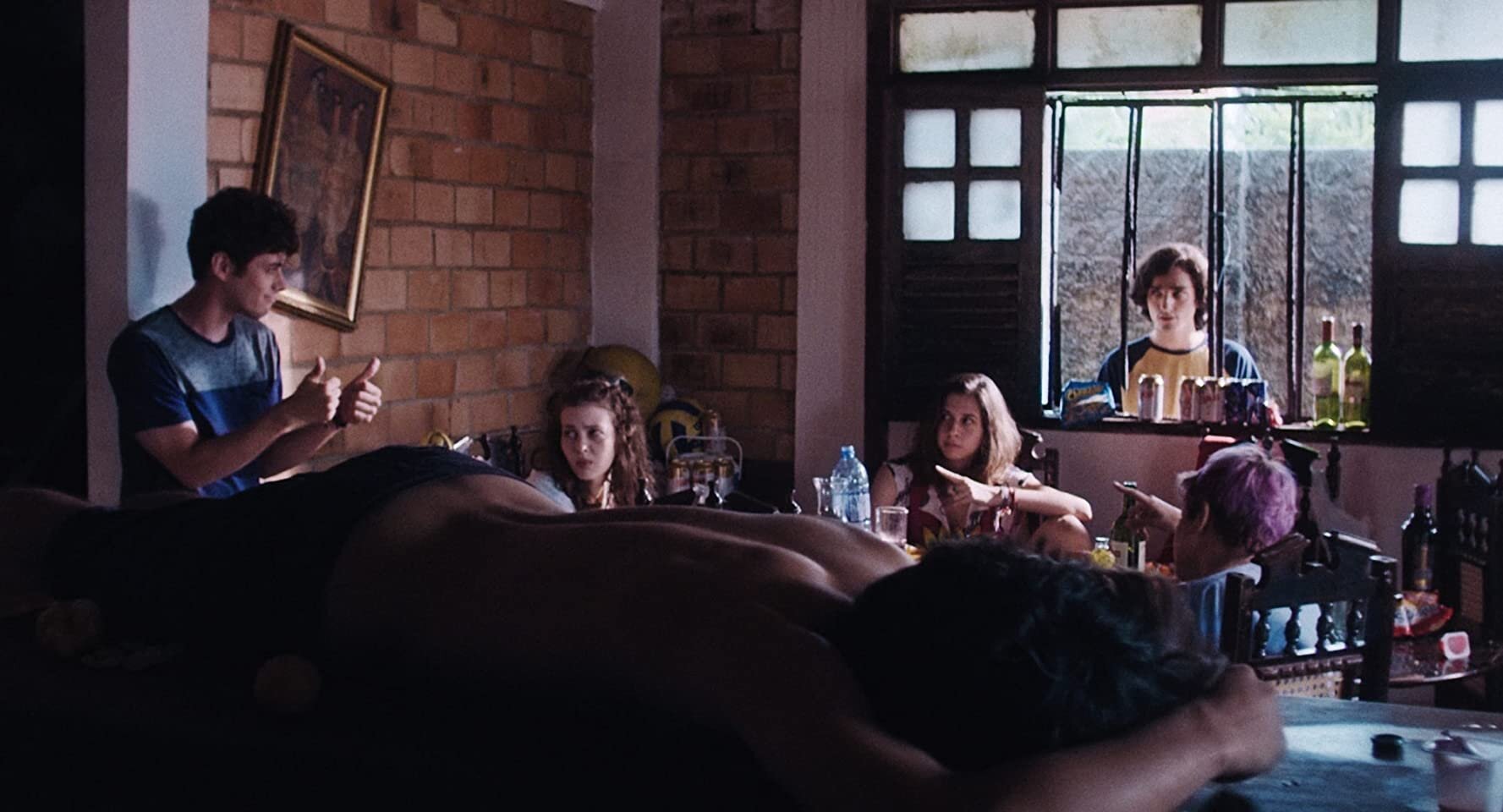[CFF 2020 Review] The Yellow Night is Slow Burn Cosmic Horror that Doesn't Catch Fire
Cosmic horror has seen a renaissance over the last few years. I’d guess it might partly have to do with the current climate, where we don’t feel like we’re in control of our lives. The idea that, just beyond our senses there’s this otherworldly presence that doesn’t care about our meaningless existence feels supremely potent right now. The Brazillian The Yellow Night capitalizes on this feeling by taking a typical horror story setup and adding a dose of Lovecraftian themes. Unfortunately, it doesn’t do much with it.
The setup is fairly standard. A group of young adult friends, celebrating the end of school, travel to a secluded island called Arco Velho, to party at Mônica (Ana Rita Gurgel)’s grandfather’s house. After arriving by ferry, it’s late and dark and their guide is nowhere to be seen. After waiting for awhile, they end up getting a ride from Vitim (Servílio de Holanda) who hands them a business card declaring him a butcher, charter truck driver and a shaman. This triggers one of the kids to discuss growing up at his father’s slaughter house, where they once had a bull that wasn’t mad, “it was possessed”; as if it knew something no one else did until they eventually just shot him.
This has no bearing on the plot.
But it does happen over a really cool tracking shot as Karina (Rana Sui), walks through Mônica’s grandfather’s house, exploring the dark, shadowy place until she eventually throws open the windows and is greeted by...the darkness? I’m not quite sure.
The rest of the group, full of impossibly attractive people, includes Caio (Felipe Espindola), Denis (Matheus Martins), Fernando (Caio Richards), Mariana (Marina Alencar), and Larissa (Clara Pinheiro de Olveira). But outside of being incredibly attractive, none of them really matter except Karina, who keeps having bizarre dreams involving doors and body swapping and a cosmic blackhole that appears in her palm and seems to either radiate darkness or is sucking up life itself.
As Karina explores the house, she finds a box of VHS tapes of Mônica’s grandfather. Turns out, he was a scientist who was exploring the concept of quantum photography and he moved to Arco Velho because it existed on the perfect coordinates to study his thoughts on other dimensions and how finicky time can be. Mônica explains that after his wife passed away, her grandfather moved here and buried himself in his studies.
It’s an interesting, if somewhat aimless, setup for a story but what follows are a bunch of little vignettes that don’t really go anywhere. We get an extended flashback/dream to our group of friends celebrating after finishing their SATs and trawling the night, getting into music fights with other kids their age, drinking and pondering life itself. One of the boys pontificates on how he is an old soul...which he means literally. This is his last life and he has a very long list of how his friends should celebrate his final funeral, including which streets to toss his ashes and how they should combine some of the rest of his ashes with bird food to feed the pigeons.
This has no bearing on the plot.
...at least in any way I could discern. Maybe I didn’t get what was being explored here or maybe it was lost in translation. Director Ramon Porto Mota and his cinematographer Flora Dias do some stunning work. Mota pulls out some fantastic performances from his cast and Dias captures some incredibly stunning shots, including one staged shot that just oozes sexuality.
It happens in a post hangover haze, as the friends gather in the kitchen and one of the guys languishes in the forefront, the camera lovingly capturing his body while everyone else holds their hurting heads.
Later, two characters are on the beach at night and as the waves crash and recede, they talk about life and the truth of what’s happening on the island. It’s dripping with darkness and shadows, with the only illumination coming from the light of a lighthouse, swinging by. The film in general uses darkness and shadows, quite effectively and utilizes empty spaces to uncomfortable effect.
The problem is the script, which doesn’t give our characters or the ominous imagery to good effect. The script is slight. Too slight for a 100 minute movie. The story simply repeats itself, over and over. And while it might tie into the thematic message of the film...it doesn’t really make for an interesting watch. Meanwhile, the Lovecraftian/cosmic horror of their situation feels muted and so subtle that I didn’t find it examined in any meaningful way.
Some intriguing ideas that just don’t click or ultimately come together.


![[CFF 2020 Review] The Yellow Night is Slow Burn Cosmic Horror that Doesn't Catch Fire](https://images.squarespace-cdn.com/content/v1/5b39608d75f9eef54c62c3f0/1590368307480-FQ05YHA0G1R17HF3M2O6/MV5BNWQxM2ZmYjAtOTdlNi00MmFlLWE0MzQtMTNlMTdjMTk4YjI2XkEyXkFqcGdeQXVyNTQxNzAwMjM%40._V1_SY1000_CR0%2C0%2C707%2C1000_AL_.jpg)



![[CFF 2020 World Premiere Review] The Ringing Bell Explores Cosmic Horror but Doesn't Quite Nail It](https://images.squarespace-cdn.com/content/v1/5b39608d75f9eef54c62c3f0/1590511542975-XJ6M1Z34OL1GNW4JWC7J/MV5BMmViMWIwMjQtYzRlZi00ODAyLTkzMTEtMzMxY2FhZjgyN2M1XkEyXkFqcGdeQXVyMTE3NjE3MTE%40._V1_SY1000_CR0%2C0%2C658%2C1000_AL_.jpg)
![[CFF 2020 Review] Climate of the Hunter is Idiosyncratic, Weird, Absurd and Amazing](https://images.squarespace-cdn.com/content/v1/5b39608d75f9eef54c62c3f0/1590508071060-26X5CTGM9CK966INFONN/MV5BMGVhNWYzYWQtMWEzOC00Mjc1LWIxYTUtYjVlZTMxMjgwNjgzXkEyXkFqcGdeQXVyMjMxOTQ0NjY%40._V1_SY1000_CR0%2C0%2C646%2C1000_AL_.jpg)
![[CFF 2020 Review] The Dangeous Visions Shorts Block is Full of Awesome](https://images.squarespace-cdn.com/content/v1/5b39608d75f9eef54c62c3f0/1590452873545-VT0WJDKPR0TMORVP8H0C/Megan%2C-26-Still.png)
![[CFF 2020 Review] The VICE Guide to Bigfoot is Laugh-Out-Loud-Hilarious and Smart](https://images.squarespace-cdn.com/content/v1/5b39608d75f9eef54c62c3f0/1590374783391-YCK08A641U8KIG5XHQTY/THE-VICE-GUIDE-TO-BIGFOOT_Teaser-1.jpeg)
![[CFF 2020 Review] The Beach House is a Horrifying Masterpiece of Quiet Terror](https://images.squarespace-cdn.com/content/v1/5b39608d75f9eef54c62c3f0/1590292094849-DNDRDLYH5XTPOXYZK1G0/The+Beach+House%281%29.png)
![[CFF 2020 Review] Jumbo is the Queerest Coming of Age Story I've Seen in Awhile](https://images.squarespace-cdn.com/content/v1/5b39608d75f9eef54c62c3f0/1590200859878-H33PZKZTDFH8B6XIG820/jumbo_affiche_web.jpg)
![[CFF 2020 World Premiere Review] Skull: The Mask Wonders What Would Jason Do in a Brazillian Noir?](https://images.squarespace-cdn.com/content/v1/5b39608d75f9eef54c62c3f0/1590125919092-9XYKQRTM6FV3JPMSWJUU/SKULL-poster.jpg)
![[CFF 2020 World Premiere Review] The Wanting Mare is a Lyrical Fantasy Unlike Any I've Seen](https://images.squarespace-cdn.com/content/v1/5b39608d75f9eef54c62c3f0/1590111755281-Z4NKH2PBSCT0V0OVYYSI/THE_WANTING_MARE_Poster.jpg)
![[News] Chattanooga Film Festival is Going Virtual with a Fantastic Lineup!](https://images.squarespace-cdn.com/content/v1/5b39608d75f9eef54c62c3f0/1589391742507-PJ2EFDQN1I6ZH0RV9PTP/image-asset.jpeg)